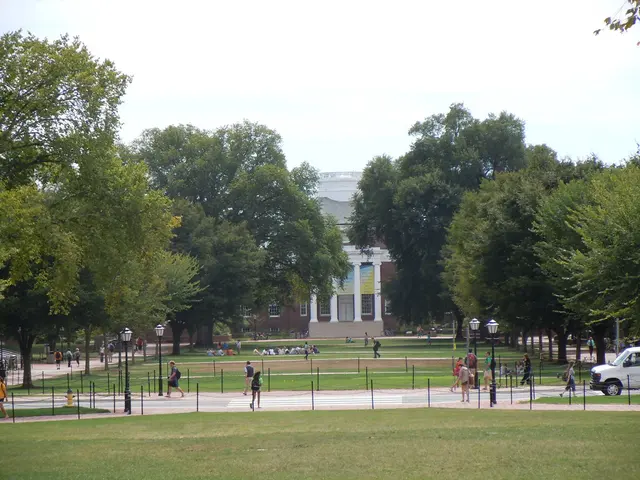Amidst Rising Scrutiny towards China, Certain U.S. Educational Institutions Discontinue a Foreign Language Course
In recent years, Confucius Institutes (CIs) have faced significant closures in American universities, with 111 out of 118 CIs shutting down by 2022, reflecting a near-complete closure driven by concerns over Chinese government influence [2]. This trend is mirrored in Senator Ted Cruz's recent amendment to the U.S. military spending bill, which aims to further restrict or eliminate these centres on U.S. campuses.
The amendment is part of a broader U.S. policy framework under the Trump administration and its successors, aimed at reducing foreign influence, particularly from China, in American higher education [2][4]. Since 2020, the U.S. administration has implemented measures such as visa restrictions on Chinese students and increased regulatory demands on universities regarding foreign partnerships, which have accompanied the shutdowns of most CIs in the U.S. and heightened scrutiny of international educational collaborations linked to China.
The CIs, funded by China's Education Ministry, with links to the Communist Party and its efforts to monitor Chinese students abroad and shape international perceptions of China, are seen as a means for China to develop its 'soft power' abroad [5]. Critics claim that the institutes seek to stifle discussion on sensitive topics like democracy, human rights, Tibet, and Taiwan [6].
Senator Ted Cruz has stated that CIs pose a threat of espionage and theft of intellectual property at colleges and universities [3]. Critics argue that CIs could be used by the Chinese government to recruit spies in the U.S. and keep close tabs on Chinese students studying there [6].
The Defense Department provides millions of dollars to train students at U.S. universities in Chinese [1]. However, a new law mandates that American universities cannot receive funding from both the Defense Department's Chinese language training program and the Confucius Institute [4].
Despite these closures, the University of Nebraska is maintaining its Confucius Institute, which sends about a dozen Chinese language teachers to high schools around the state [7]. The University of Oregon, which previously received close to $1 million annually from the Defense Department's Language Flagship program for Chinese language studies, with about a third of that funding going to Portland public schools, has closed its Confucius Institute but continues to receive funding for China-related conferences, workshops, and guest speakers [8]. Both universities maintain full control of their curricula and do not see evidence that the CIs are interfering with academic programs [9].
In conclusion, the CIs are largely defunct in U.S. universities at present, with ongoing legislative and administrative actions reinforcing their closure or severe limitation. The future of these cultural and language centers remains uncertain, as the U.S. continues to grapple with balancing academic freedom, national security, and international relationships.
- The government's political stance, particularly under the Trump administration and its successors, has taken a firm stand against foreign influence in American education, with a focus on reducing Chinese influence.
- The ongoing closure of Confucius Institutes (CIs) in American universities is reflective of this policy, as concerns over Chinese government influence persist.
- Senators like Ted Cruz have proposed amendments to strengthen this stance, aiming to further restrict or eliminate CIs on U.S. campuses.
- Critics argue that CIs, funded by China's Education Ministry and linked to the Communist Party, serve as a means for China to shape international perceptions and cultivate its 'soft power'.
- Concerns over CIs extend beyond Chinese government influence, with criticism that they seek to stifle discussions on sensitive topics like democracy, human rights, Tibet, and Taiwan.
- Additionally, there are concerns that CIs could be used for espionage and intellectual property theft at colleges and universities, potentially recruit spies, and monitor Chinese students. The balance between academic freedom, national security, and international relationships continues to be a point of contention in discussions regarding CIs.




